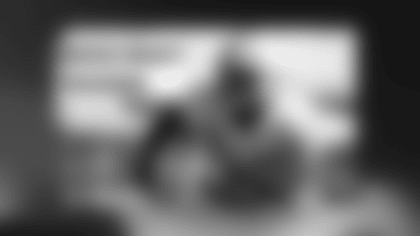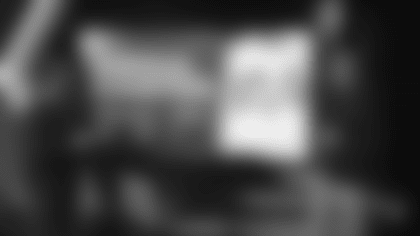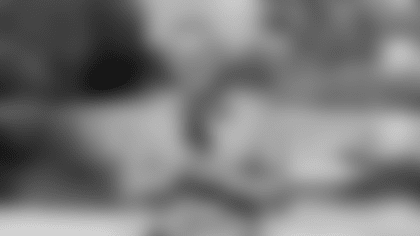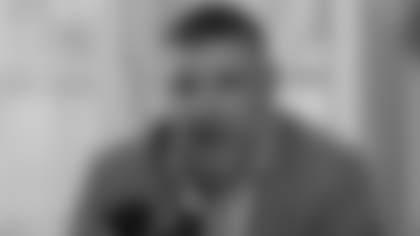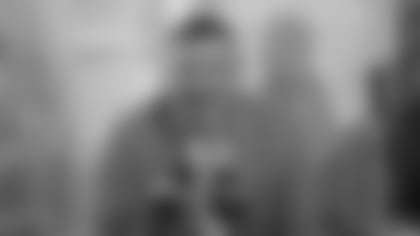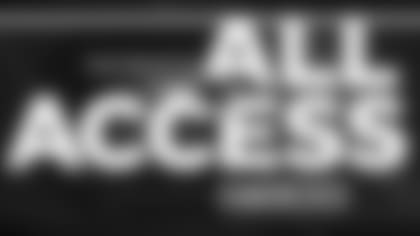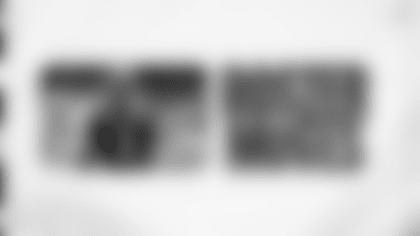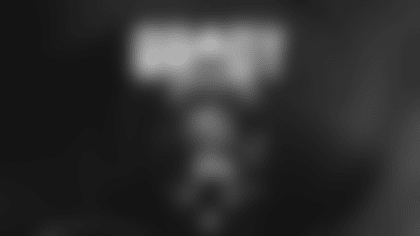Q: The Broncos have recently been splitting running back reps between three guys. Are they using them in different situations?
BB: I mean, you could get any of them at any time. I mean, they're all good. Obviously, [C.J.] Anderson's done a great job for them - a hard-running guy, tough, good balance, gets a lot of tough yards. [Jamaal] Charles is a great back. He's got good vision, kind of a big play threat, and [Devontae] Booker's just been coming on. You know, he had the wrist early and kind of got slowed early in the season, but each week, he seems to be in a little bit more prominent role. He's done a good job for them in the passing game, but he's a hard guy to tackle. He did a great job at Utah - run the ball, breaking tackles. I mean, he's good. So, yeah, all those guys, they're good.
Q: Does Booker kind of split the difference between the other two backs as more of an all-purpose guy?
BB: Yeah, but he's a big guy. I mean, he's not like a little scat back. I mean, he's big and strong. He's a physical runner, but he has quickness. I wouldn't say he had a lot of opportunities in college to show up in the passing game, kind of like James [White]. In the offense James was in, he wasn't featured as a receiver. I would say Booker wasn't featured as a receiver in the Utah offense, but he's shown - going back to Ray Rice, I don't know if Ray Rice caught a pass in college. You know, he was the third-down back and returned kickoffs in the NFL, so sometimes that happens to those guys. They just don't get the opportunity in college for one reason or another, but it's not that they can't do it. It's just they didn't get a chance to do it. But, yeah, Booker's shown up good in the passing game, as well.
Q: What have you seen from Lawrence Guy? It seems like he's been pretty versatile and durable since he's been here.
BB: Yeah, he has. Lawrence is out there every day. He's a hardworking guy, he's tough, very professional, comes to work every day, works hard, wants to know what you want him to do and tries to do it the best that he can and works very hard at it. So, I have a lot of respect for him and the way he's approached everything all year - new team, new situation, but he's embraced it and has really given us a great effort every single day, not just on Sunday, but every day he's come in and done everything he can do to be a better player to try to help the team.
Q: What are your thoughts on what Adam Butler's been able to do?
BB: Yeah, same thing. You know, [he has] less experience but has done multiple things for us, which is what he did in college. [He is a] smart kid, works hard, has tried to improve in all the areas that we've asked him to improve in. He's really professional, works hard, knows what we're doing, knows what our opponents are doing.
Q: When you met with him at Vanderbilt, did he strike you as mature beyond his years?
BB: Yeah, he's a pretty mature guy, smart guy, understood the whole defense, played a lot of different positions. They had a rotation of defensive linemen, and depending on which other guys were in, then he kind of moved to the spot. So, if a nose came in, he moved outside, if an end came in, he moved inside - things like that. So, he was kind of the guy that adjusted to everybody else, but he understood everything and he embraced that. It wasn't like he felt like he was not being used properly or anything like that. He was doing what was best for the team, he understood the situation and he did a good job with it.
Q: What improvements have you seen from LaAdrian Waddle since last season?
BB: Yeah, it started in the offseason. He had a really good offseason, good spring and I think he's improved his overall strength, his mobility, he's in good condition. You know, he kind of took a while - when we first got him, I think he was still dealing a little bit with the knee injury from Detroit. And, I don't want to say last year, but it's just over a period of time, between hard work, maybe it's some just physical improvement - I don't know, some combination of the two - but he looks and plays kind of like what we saw in Detroit before the injury.
Q: Andrew Jelks has been back at practice the last couple of days. Is that kind of a wait and see approach with him to see if you need him?
BB: Yeah, I mean, he hasn't played football in over two years, so he's obviously been excited to get back out there and to be able to start playing. He's done a lot of rehabbing, but really, I think we're past that. It's really just training, and due to the rules that are in place, his opportunity to come back and play, that window has just recently opened. We felt like this was the best time to take advantage of it. We could have done it a couple weeks earlier, but with the bye and all that, we felt like this was a better time for him. So, it's good to have him out there. I know he's excited to be out there. He's worked extremely hard. Yeah, we'll see what happens.
Q: Even though he hasn't played football in a couple of years, what are your initial impressions of him on the practice field?
BB: That he hasn't played football in a couple years. I mean, he's got talent and he works hard and he's done all the drills that he can do - bags and shields and sleds and cones and all that. Now it's actually football. I mean, there are live bodies out there. It's a lot different than hitting a pad. So, he's adjusting to those things, but he's going to work hard, he's going to get better, and we'll see where it goes.
Q: Does the strength program have to be tailored to veteran players and their technique when you talk about guys that may have been trained one way in another organization and then come here and have to learn how you want them to train?
BB: Well, what we try to do is just put the player in the best possible physical position that he can be and that's strength, flexibility and explosive power. That's what we train for. That's what we try to do. I can't really speak to other team's programs or what they do or don't do. I'm not at those teams, but I know when players come here that they a lot of times tell us that these are things they haven't done in a while. Maybe they haven't done them since college or they did something different somewhere else, which is fine. Everybody has their own program - I'm not saying that. It's just what we do we feel is what prepares the player the best to play here, not play somewhere else or train for a combine or anything else. We try to get the players ready to play the position that they have to play for our football team. So there is some variation in the training based on the position the player plays and also maybe his physical situation, how young, or old, or whatever physical limitations he may have, then we work around those. Although there are some things that are the same there are a lot of differences when you start talking about different body types playing different positons. We try to gear our training towards what will help that player the most plays for us. That's him, that's everybody else.
Q: How do you feel about your team's depth at offensive tackle? Is it rare to have that many bodies capable of playing that position?
BB: Well, I think that's a position that I feel like is an important position to have depth there. You want to have depth at every position but those guys are hard to find. If you're tackle-poor I think that can show up a lot quicker than being poor at other positions. Tackle - you can help them a little bit but they're single blocking most of the game. I'd say it's hard to help that positon. Not impossible, but it's hard.
Q: Is it more difficult now to find capable tackles than in the past?
BB: Yeah, I don't know. I mean, that's always a hard position. Just take a look at the salary cap and look at the salaries. [They are] the guys that get paid the most money by position. I mean, that's really all you need to know.
Q: What did you take away from your experience working with Martellus Bennett?
BB: I think I've spoken about that numerous times last year. Stacey [James] - I'm sure we have transcripts of that. I can't imagine [we don't]. I must be on the record talking about him 100 times.
Q: How much do you cross train some of your interior offensive linemen to be able to play on the outside at tackle?
BB: Right. Yeah, well, again, you have seven linemen. We normally have seven linemen that go to the game, sometimes eight. I would say never six. So those seven guys have to play 10 spots, five plus five. You've got to have backups there. That's part of the positional flexibility that some players have which is a good thing but not a prerequisite. If a guy is a good player at a position then that's a good thing, too. Guys like Steve Neal that only played right guard, or David Andrews, Dan Koppen that only played center. They played it well. They're good players. There's a lot to be said for that. [Joe] Thuney's another guy that was a tackle, played left tackle at N.C. State. Well, he played guard his junior year but played left tackle at N.C. State. [Logan] Mankins played left tackle at Fresno. Just talking about pass protection, pass blocking is pass blocking. If you can pass block at left tackle then you can probably pass block at left guard. If you can pass block at left guard, you may not necessarily be able to pass block at left tackle. Again, those are hard positions to find. I'd say that's why the average salary at those positions are what they are and guys get drafted at those positions higher than the interior positons. I mean, they just do. I don't think that's a position that you want to be poor at and I would say also that position, at times, takes some development. It's hard to get NFL-ready guys at any position to come in but tackle is a difficult one to come in and just from 'Day One' perform at a high level. Sometimes it takes a year or two like it did with - Marcus Cannon is a good example. But we've had other guys fall into that category as well. If you get them early and you have time to work with them then maybe you can bring them along at your pace instead of throwing them in there and having some plays that you don't want to have before you want to have them.
Q: Is that due to the way the college game is played and the number of offensive systems that play a spread-style offense?
BB: Yeah, I'd say there's not a lot of teams that drop back and throw intermediate-type passes. A lot of three-step drop plays, really passes that are runs. Then they go back and max protect and toss up go-routes and posts to big, fast receivers against small, slow corners. Yeah, so they don't get a lot of training in that. I don't think they see some of the line games that we see, twists and things like that that are, I'd say, more a part of the NFL pass rush than college. Some of that is due to option and other things that they have to defend. Some of it is just guys in this league are a lot more technique-wise, a lot further along in their pass rush moves in variety, in technique, so hard to block.
Q: Were you scouting former Boston Celtic, Dino Radja, for possible field goal blocking opportunities yesterday at practice?
BB: Yeah, he'd be good, wouldn't he? It would be hard to kick it over him.
Q: What is the connection with him? How do you know him? How is your neck doing looking up at a guy that tall?
BB: It needs some treatment. He's a big guy. Yeah, he's a big guy. He's a great guy though. It was good to have him around.



